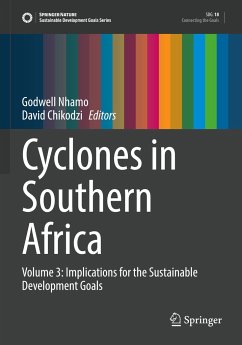Tropical cyclones in Southern Africa, also known as hurricanes or typhoons in other regions of the world, is a hot subject for academic research. This focus has been magnified by the need to consider tropical cyclones in the context of other global development agendas, that includes the 2030 Agenda for Sustainable Development and its inseparable 17 Sustainable Development Goals (SDGs), the Paris Agreement, the Sendai Framework for Disaster Risk Reduction and Habitat III's New Urban Agenda. The ambitious SDGs challenge global and community leaders to make sure development addresses the nexus among poverty, inequality and employment creation, as well as care for the earth and its natural resources and biodiversity. The SDGs further present an agenda to eradicate hunger, bring quality education and sustain water and sanitation. The infrastructure development, human settlements, sustainable consumption and production, climate change, biodiversity and the ocean (blue) economy agendas arealso pitched. Lastly, the 2030 Agenda for Sustainable Development encourages partnerships on delivering various programmes and projects at all spatial levels. However, as tropical cyclones continue to make multiple landfalls and ravage Southern Africa and other parts of the world, the achievement of the 2030 Agenda for Sustainable Development is threatened. To this end, this book addresses this gap by documenting the implications of tropical cyclones, drawing examples and case studies from recent tropical cyclones such as cyclone Idai and cyclone Kenneth that resulted in catastrophic impacts in 2019. The book comes as part of a series with three volumes. The other volumes include "Cyclones in Southern Africa Vol. 1: Interfacing the Catastrophic Impact of Cyclone Idai with SDGs in Zimbabwe" and "Cyclones in Southern Africa Vol 2: Foundational and Fundamental Topics". Given the foregoing, the book is suitable as a read for several professionals and disciplines such as tourismand hospitality studies, economics, sustainable development, development studies, environmental sciences, arts, geography, life sciences, politics, planning and public health.
Bitte wählen Sie Ihr Anliegen aus.
Rechnungen
Retourenschein anfordern
Bestellstatus
Storno

